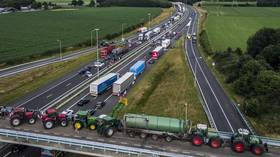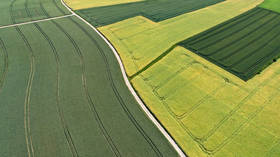Dutch farmers block supermarket warehouses

Dutch farmers have shut off access to supermarket distribution centers to protest the government’s green reforms, a move that would hit the nation’s agricultural sector, local media reported on Monday.
According to local broadcaster Nederlandse Omroep Stichting (NOS), protesters have blocked several warehouses across the country, including in the cities of Heerenveen, Raalte, Deventer, Woerden, Breda, and Nijkerk. As a result, food trucks cannot use many of the distribution centers.
The Central Bureau of Food Trade (CBL), the Dutch supermarket organization, said it would be “completely unacceptable” if the blockade drags on. “We have called the judicial authorities and the police to take care of the situation,” the organization’s director, Marc Jansen, said.
The CBL has called on the authorities to consider further steps against the protestors. “We must be able to address this misconduct,” Jansen said, arguing that supermarkets are not a party to the stand-off.
The organization added that food shortages affecting products such as bread, fruits and vegetables, and milk will soon follow if the protesters using trucks and tractors do not end the blockade.
“Some distribution centers also supply hospitals, care centers and other vital services,” Jansen said.
On Sunday, confronted with the possibility of large-scale protests, the Dutch police advised people to work from home, saying they are ready to intervene should the situation get out of hand.
Dutch farmers are upset over the government’s push to slash the emissions of pollutants, including nitrogen oxide and ammonia, by 50% by 2030. The concern is that fertilizers contain a large amount of nitrogen oxide, while livestock produce ammonia in their urine and feces.
The green reforms would likely hit the agricultural sector, forcing farmers to reduce the number of livestock or cease operations altogether. Many fear the ruling coalition’s reforms will simply put them out of business.
In late June, Dutch Prime Minister Mark Rutte said that farmers have the right to protest, but warned that their actions should be lawful.
“It is not acceptable to create dangerous situations, it is not acceptable to intimidate officials, we will never accept that,” he said.













